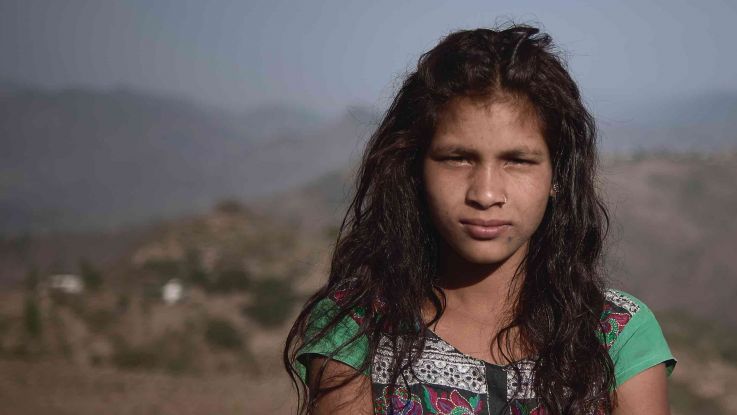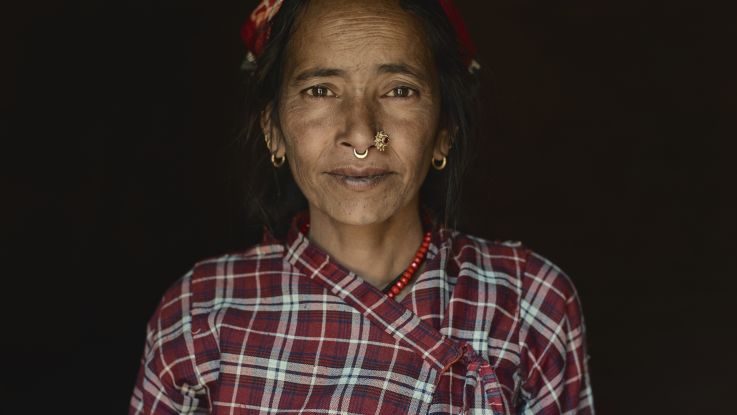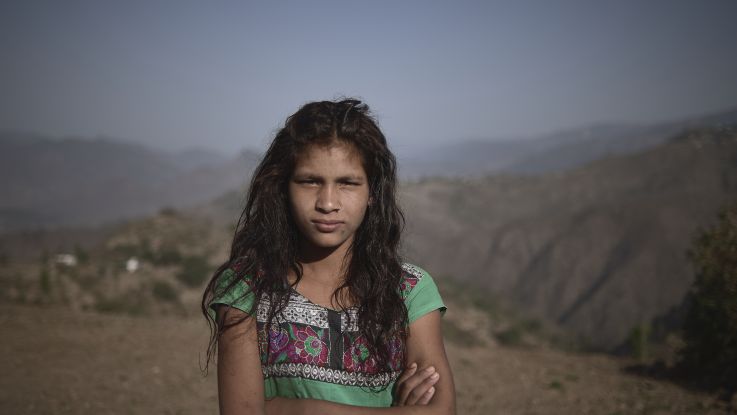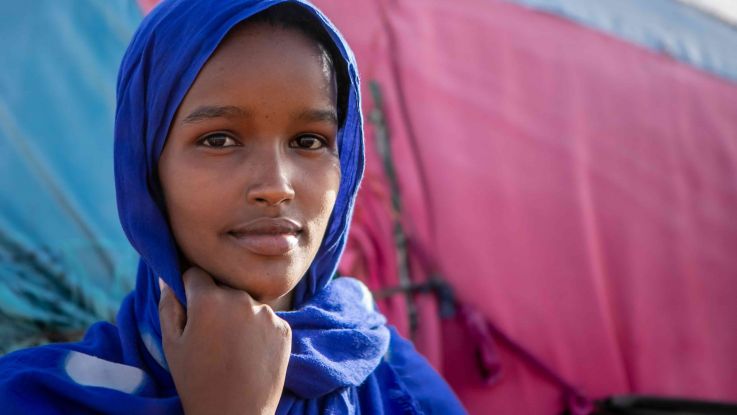Chhaupadi and menstruation taboos
Inside chhaupadi huts
When Geeta was 11 years old, she was banished from her home. For 21 days she lived alone in a small hut, far away from her family and friends. For most of that time she couldn’t go to school, and spent her days cleaning, sweeping, and cutting grass. She missed her mum, her dad, and her little nephew. She wanted to go home.
‘Home’ for Geeta is a remote village in western Nepal. In parts of this region, chhaupadi is still practised. "People think that if a menstruating girl touches them, bad things will happen, and people will get ill," Geeta explains. "God will be angry."
Because of taboos around menstruation, Geeta can’t sleep in her own bed, eat certain foods, or hug her parents.
We aren't given nutritious food, and we are not treated like humans."
Like other ‘chhau’ girls (girls on their periods), she is forced to live in a remote hut or animal shed, with no access to running water. As Geeta describes: "We have to live in a hut away from home. We aren’t given nutritious food, and we are not treated like humans."
Ishu is 14 years old and like Geeta, is sent away from home during menstruation. She dreads getting her period because she hates staying alone inside the chhaupadi hut.
"The goth [hut] I’m living in is made from mud," Ishu says. "It doesn’t have a window and during the night-time I feel afraid. I feel scared of snakes and ghosts. When I was sleeping in the night, I felt scared some bad people would come and attack me."
When Ishu is living in the hut she finds it difficult to manage her period. She must walk to the nearest river to bathe—a two-hour walk away.
Without access to sanitary pads, she has to use rags to soak up the blood. These can cause serious and painful infections. Alone and isolated in the chhaupadi hut, Ishu misses the comforts of home: "I can’t bring warm clothes to the hut—that’s why I feel cold in the winter. There are no windows and during the summer season I feel really warm."
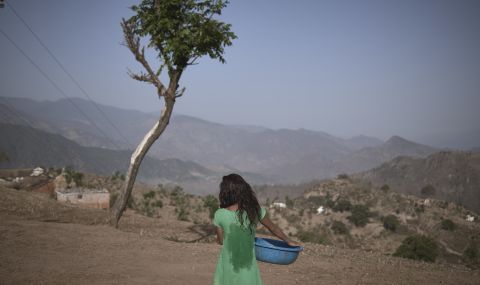
Ishu, 14, is banished to a hut every month when she has her period.
The dangers of chhaupadi in Nepal
Chhaupadi also puts girls' lives at risk.
In recent years, two girls are known to have died as a result of the practice. One was a 19-year-old girl who died from a snakebite while sleeping alone in a shed. Another was a 15-year-old girl who suffocated to death after lighting a fire to stay warm in her poorly ventilated hut.
Given the dangers facing girls during chhaupadi, it is unsurprising that parents like Durga, Ishu’s mum, feel unhappy about banishing their daughters during their periods.
"I am very scared when my daughter is out in the chau goth [hut]. I am scared if some bad boy comes and rapes her," Durga says. "We don’t feel good about practising chhaupadi, but since other communities are practising it we are forced to [do] it."
I am very scared when my daughter is out in the chau goth [hut]. I am scared if some bad boy comes and rapes her."
The reasons why chhaupadi continues are complex. In parts of western Nepal, the custom has been carried out for centuries and is intimately linked with local belief systems and ways of life.
In rural communities, people rely on the crops they harvest and the animals they rear for their livelihoods. If women and girls do not follow these strict local customs, this could have serious consequences. It is believed that crops may fail, and people and animals may sicken or die, as Geeta’s mum, Dhauli, explains:
"I believe in chhaupadi because I had one bad experience. When I was having one of my sons, my husband gave me buffalo milk for three days. On the fourth day, the buffalo had blood in its milk, so I stopped drinking it. We think it happened because we made God angry by drinking milk. We have been practicing chhaupadi for many years, and I feel that God will be angry if we stop."
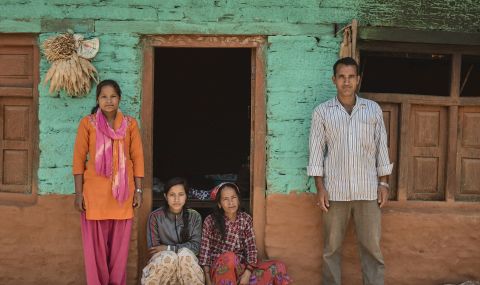
Geeta, 14, is pictured with her family. From left to right: Geeta's aunt, Sunita; Geeta; Geeta's mum, Dhauli; and Geeta's dad, Tez.
The social customs enforcing menstruation taboos
For many women, girls and people who menstruate, the pressure from the local community to uphold these traditions is as important as the possible consequences that failing to practise chhaupadi might have. "I didn’t like to be in the chhau goth [hut] in my childhood, but I had to obey social practices," Dhauli says. "I feel that for my daughter, it would be better for us to sleep in the same house, but we have to obey because society is like that."
Durga agrees: "I have to practise it just because of the social pressure. If I didn’t practice it, I would be alone from the community."
This fear of being isolated and ostracized is one that is shared by many, as a local police constable, Rajkumari, knows all too well. She’s working on the ground in western Nepal, alongside ActionAid, to end the practice of chhaupadi and raise awareness about its negative impact amongst the local community.
"The women and girls should not be kept in the hut, as this [menstruation] is a natural process," Rajkumari says. "If they are kept in the hut, it is discriminating [against] them. In some cases, women and girls are losing their lives - they are dying in the hut - so it should be stopped."
In some cases, women and girls are losing their lives - they are dying in the hut."
Rajkumari is passionate about bringing an end to chhaupadi, but the challenges she faces are immense. On one occasion, when responding to a chhaupadi case, she came under intense pressure from the local community not to report it: "People from the community came – while we were registering the case – and they said that "This is our culture, and it is not right to register [it]."
Despite the difficulties she faces, Rajkumari is hopeful that the future for girls in her area is gradually improving. Since chhaupadi was made illegal in 2005, the number of cases has dropped. "People are a little bit afraid," she says. "They think that if they continue [..] the police will come and arrest them."
She also firmly believes that the awareness raising initiatives introduced by ActionAid have made a difference. "The number of cases has decreased," she says.
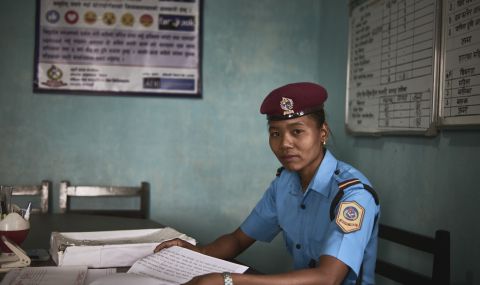
Rajkumari, 23 is a police constable in the Doti district in Nepal. .
The female activists campaigning to end chhaupadi
ActionAid has been working in western Nepal for more than 10 years. We have set up women’s groups, where local women can come together to find solutions to the challenges they face. During these meetings – called ‘reflect circles’ – women have the opportunity to discuss the impact of chhaupadi on their lives and its illegal status. As Gauri, 26, a member of an ActionAid reflect circle, explains:
"[During menstruation] I had to sleep below [a] goat shed and whenever the goat urinated, it went all over my body. That made me feel really bad…that motivated me to go against chhaupadi. I became a member of a reflect circle and I got sensitised [informed] that it is not the right thing to practice. This made me move away from the chhaupadi practice."
I had to sleep below [a] goat shed and whenever the goat urinated, it went all over my body."
Gauri now campaigns to end chhaupadi in her community. At first her husband and her in-laws were reluctant to let her stay at home during menstruation. "They thought it was not the right thing to sleep inside," Gauri admits. "But we convinced them."
Now, with the support of ActionAid, other young women are challenging period taboos and standing up to discrimination in their communities. Parbati is 17 years old and a member of an ActionAid-supported girls’ group. Through the group she has received training on her sexual and reproductive rights, as well as the dangers of chhaupadi. "I was told it is unsafe to stay in the chau goth [hut]," Parbati says. "Personal hygiene is not maintained in there."
Parbati told her parents about what she had learnt at the girls' club, and started staying at home during her period. "My parents became happy when I started sleeping inside they house because they feel I am unsafe in the chau goth [hut]," she says.
Since ActionAid began working in Nepal, more than 1,400 women of reproductive age have stopped practising chhaupadi. In the last five years, ActionAid – alongside local partners - has helped to establish at least 11 ‘chhaupadi-free’ communities, and through awareness raising initiatives, people’s beliefs around menstruation are changing. "I hope that, whatever we have faced now, girls will not be able to face this kind of discrimination in the future," Rajkumari says.
Footnotes
- 1https://karuna.org/menstrual-exile-the-dangers-of-chhaupadi-in-nepal-and-what-it-means-for-women-and-girls/
Page updated 22 January 2025


